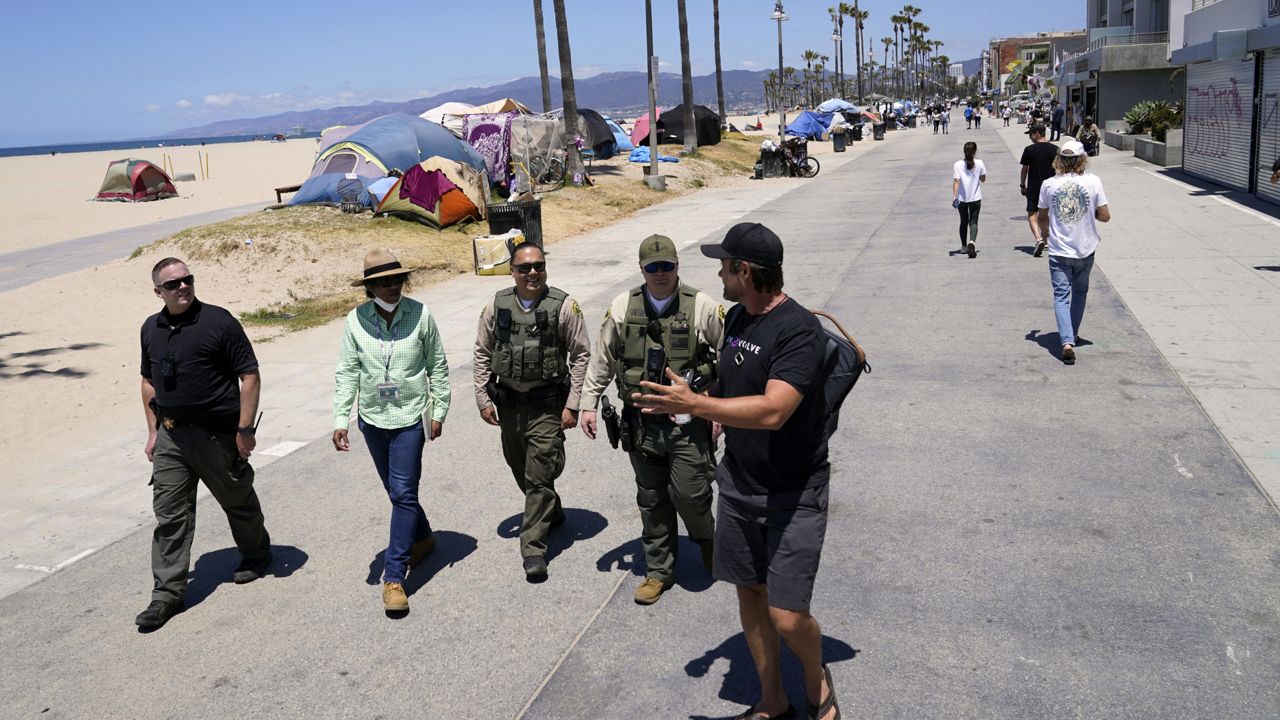LOS ANGELES (CNS) — The Los Angeles City Council voted Wednesday to resume its encampment cleanup program, known as CARE+, on Sept. 1 with new "enhanced street engagement strategies" requested by Councilmembers Mike Bonin and Nithya Raman.
CARE+ was temporarily paused during the COVID-19 pandemic, but on July 29, 2020, council members voted to continue cleanups around "A Bridge Home" shelters.
Bonin and Raman introduced a motion on Jan. 12 that was unanimously approved by the City Council in April to have the Los Angeles Bureau of Sanitation (LASAN), in consultation with the Los Angeles Homeless Services Authority, develop standards for street engagement and hygiene services "with a preference toward voluntary compliance whenever possible." The motion said the city's policy should be guided by the Hippocratic oath, "first, do not harm."
They contrasted Los Angeles' policy to conduct forced cleanups, during which unhoused residents must take down their tents and move their belongings, to U.S. Centers for Disease Control guidelines, which state: "If individual housing options are not available, allow people who are living unsheltered or in encampments to remain where they are. Clearing encampments can cause people to disperse throughout the community and break connections with service providers. This increases the potential for infectious disease spread."
On June 25, the Bureau of Sanitation sent the council a report on how some of the suggestions can be incorporated into its operations, and on Wednesday the council instructed the bureau to resume operations citywide on Sept. 1 and incorporate the following strategies:
- tent exchange and distribution
- voluntary trash disposal options
- sanitary kit distribution
- EZ-Up tents and bottled water distribution
The bureau will also request appropriate trained personnel during cleanups to ensure outreach and services engagement, develop pre-deployed voluntary trash disposal options, provide training to staff from various agencies, including mental health awareness, de-escalation techniques and legal guidance and review, and add positions and funding for a Livability Services Division identified in the new fiscal year budget.
"We need to make sure we're identifying funding for those outreach workers. I'm excited to move ahead with this motion Wednesday but I'm also excited to the second part of this work which was a report from CAO and CLA laying out what additional resources are needed in terms of funding outreach teams that can really accompany our CARE+ teams and do this work right, do it in a trauma- informed way, and get to all the great outcomes that we've been discussing Wednesday," Raman said.
The Bureau of Sanitation's Domingo Orosco advocated for adding outreach workers to sanitation bureau operations.
"We've often been included in the larger social services discussion, however LASAN's role is the removal of health hazards, as well as addressing trash, litter and debris within the public right-of-way. There's a clear benefit to having service providers who can have forged meaningful and lasting connections with people experiencing homelessness present and participating in the work that we do," Orosco said.
The vote comes a day after the City Council voted to instruct the city attorney to draft an ordinance that would restrict sleeping and homeless encampments in certain areas of the city, which critics say would criminalize homelessness.
"This is a criminalization ordinance that leaves gaping holes of discretion for city departments and law enforcement. It's written so broadly that it becomes impossible to comply with purposely vague language defining where you can exist," the Los Angeles Community Action Network tweeted.
City Attorney Mike Feuer was instructed to prepare an ordinance, which will be considered by the council during a special meeting Thursday, that allows the city to "maintain passable sidewalks and access points by preventing sitting, sleeping, lying, storing personal property or otherwise obstructing the public right-of-way within two feet of any fire hydrant or fire plug, or within five feet of any operational or utilizable entrance or exit, or within 10 feet of a loading dock or driveway, or in a manner that interferes with any activity for which the city has issued a permit, or in a manner that restricts accessible passage as required by the Americans with Disabilities Act, or anywhere within a street, including bike paths."
That motion also instructs the city administrative officer to develop and implement a Street Engagement Strategy within 30 days to offer people suitable and available overnight shelter, interim housing or permanent housing.



